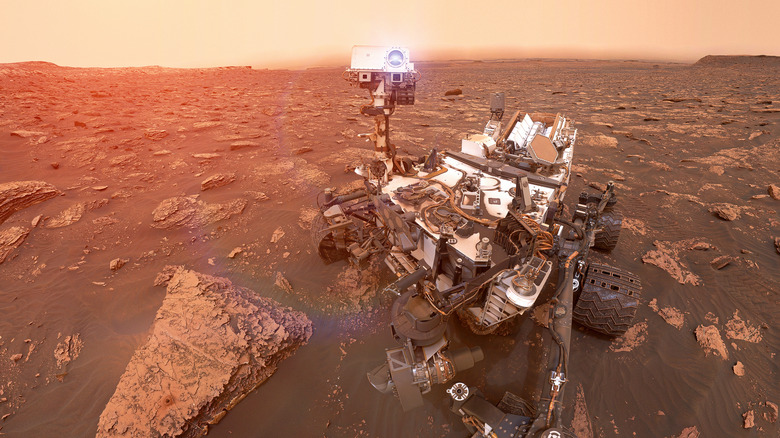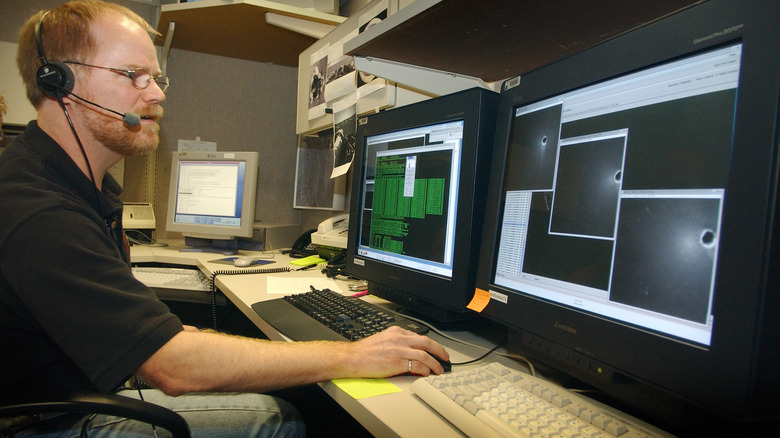Mars Opportunity Rover's Final Words Before Scientists Lost Contact
The National Aeronautics and Space Administration (NASA) has accomplished some amazing feats since its inception in 1958 (per the Dwight D. Eisenhower Presidential Library, Museum, and Boyhood Home). Some of those achievements include sending men to the moon, deploying the Hubble Space Telescope, and landing equipment safely on Mars (via Kennedy Space Center). One of the most impressive Mars missions was that of the Mars Opportunity Rover, a robot with six wheels and a camera perched on top of a long neck. Opportunity was launched in 2003 and landed on the red planet on January 24, 2004.
Opportunity's mission was to spend 90 Martian days searching the planet for signs of water. Surprisingly, Opportunity, nicknamed "Oppy," lasted much longer than that — it went on to gather data for more than 14 years. Throughout its mission, the rover took 228,771 images from Mars (via NASA), and it sent messages to Earth about many aspects of the Martian terrain (via Jet Propulsion Laboratory). But the rover's last message may have been its most poignant.
Opportunity's last message was dark
Opportunity's last message garnered quite a bit of attention due to a tweet that paraphrased the rover's last words: "My battery is low and it's getting dark." But that's not exactly what the Opportunity "said." SpaceFlight Insider reports that Opportunity communicated with engineers on Earth through code, and the last message was part of a regular update. That message contained information about equipment measurements: One was that the battery's energy level was dropping and the other was that the level of light was low due to the dust on its panels. John Callas, Opportunity project manager, tells Newsweek that Opportunity's last words were that "the skies were incredibly dark, to the point where no sunlight gets through. It's night time during the day."
The darkness resulted from a storm that developed quickly on Mars in 2018. The storm was powerful enough that scientists thought it might cause problems for Opportunity, per NASA. It produced a thick layer of dust that covered the rover's solar panels. While the storm passed and the skies cleared, Opportunity didn't wake up (per Spaceflight Insider). NASA reports engineers tried thousands of times to reconnect with the rover, but were unsuccessful. Opportunity sent its last transmission to Earth on June 10, 2018 (via NASA).
Opportunity was like a 'family member'
Opportunity lived a long and successful life, exploring more than 28 miles (via NASA). Among its discoveries are the first meteorite on the Red Planet, dust devils, and evidence that Mars may have supported life for millions of years (via Space.com).
Along with discoveries expanding our knowledge about Mars, Opportunity developed a fan base that extended beyond scientists working on its mission. But those working with the mission would feel Opportunity's loss more. SpaceFlight Insider reports that some who worked directly with Oppy couldn't help but become teary-eyed after coming to terms with the fact that the mission was over. Photographer Carleton Bailie, who covered Opportunity's mission for Boeing, says, "Opportunity was kind of like a family member and this last 'message' was sad, but I knew it had a great life" (via SpaceFlight Insider). And the rover is still popular today, with its own place on the internet where fans can send it a postcard (via NASA Science Mars Exploration Program).


